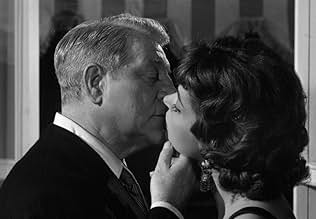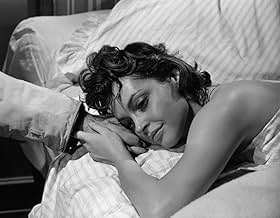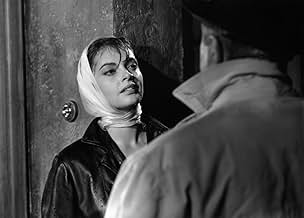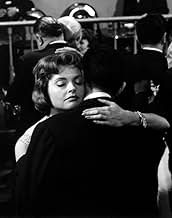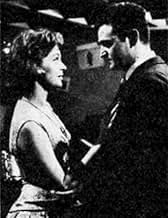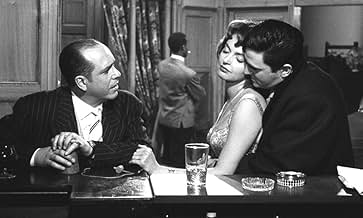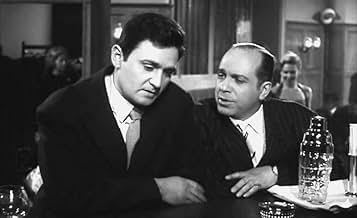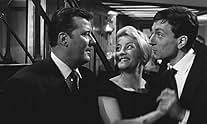VALUTAZIONE IMDb
6,5/10
796
LA TUA VALUTAZIONE
Un vice ispettore della polizia di Parigi è particolarmente interessato alla difficile situazione di Lucky, tossicodipendente, che considera più vittima che criminale.Un vice ispettore della polizia di Parigi è particolarmente interessato alla difficile situazione di Lucky, tossicodipendente, che considera più vittima che criminale.Un vice ispettore della polizia di Parigi è particolarmente interessato alla difficile situazione di Lucky, tossicodipendente, che considera più vittima che criminale.
- Regia
- Sceneggiatura
- Star
Recensioni in evidenza
The old treasures of worldwide's cinema reachs us after DVD's advent, this month came out a box of French's Noir, inside it a little gem with the great Jean Gabin and Danielle Darrieux, this pleasant picture was directed by an unknown craftsman Gilles Grangier who wasn't got a propper respect like others french directors, but he owes nothing to anybody else, in fact a little masterpiece, driven it to smallest persons or invisibles ones who carry the world, besides Gabin desmiss any kind of feedback over such prominence who includes Darrieux too, all small characters has something to offer for the picture's success while still doesn't appeared here on IMDB yet, but cetainly in short time as soon as possible in face a priceless work!!
Resume:
First watch: 2018 / How many: 1 / Source: DVD / Rating: 8.75
Resume:
First watch: 2018 / How many: 1 / Source: DVD / Rating: 8.75
Jean Gabin is not playing Inspecteur Maigret here, but he is a detective investigating the murder of a night club owner who also deals heroin. Nadja Tiller plays a glamourous habituee of the club who falls for Gabin; she is also a junkie. Her scene of withdrawal is far from the gritty reality, she just seems to have a hangover and sweats a bit.
I was impressed with Hazel Scott in a small part as the club's pianist-singer. This Barbadian-born performer married Adam Clayton Powell and had to leave the US in the Fifties because of her leftist politics. She was played by Vanessa L. Williams in a recent made for TV movie. On the basis of this small part, she could have had a career like Dorothy Dandridge's.
I was impressed with Hazel Scott in a small part as the club's pianist-singer. This Barbadian-born performer married Adam Clayton Powell and had to leave the US in the Fifties because of her leftist politics. She was played by Vanessa L. Williams in a recent made for TV movie. On the basis of this small part, she could have had a career like Dorothy Dandridge's.
When the middle-aged police inspector Georges Vallois (Jean Gabin) is assigned to investigate the murder case of a drug dealer, the suspect is his addicted mistress Lucky Fridel (Nadja Tiller). But soon Vallois and Lucky have a love affair and he believes she is innocent and needs rehab.
"Le désordre et la nuit", a.k.a. "The Night Affair", is a different film-noir. The storyline shows a dirty tale with an old police inspector having an affair with a junkie woman that could be his daughter and manipulating the events in the end to present the best solution for the case. My vote is seven.
Title (Brazil): "Vício Maldito" ("Damned Addiction")
"Le désordre et la nuit", a.k.a. "The Night Affair", is a different film-noir. The storyline shows a dirty tale with an old police inspector having an affair with a junkie woman that could be his daughter and manipulating the events in the end to present the best solution for the case. My vote is seven.
Title (Brazil): "Vício Maldito" ("Damned Addiction")
It is rare for a translated title of a film to be more inspired than the original title. I think this is the case with 'Le desordre et la nuit' directed in 1958 by Gilles Grangier, one of the most prolific French film directors in the first two decades after the Second World War, and a regular collaborator of Jean Gabin, who dominates the cast of this film. The English title is 'The Night Affair', which is much more appropriate in my opinion for the story and atmosphere of this film that combines a police investigation, a sentimental thread and a social investigation into the nightlife of Parisian clubs, infested by dubious business, prostitution and drug trafficking. The presence of Jean Gabin is one but not the only reason why this film, even if it is not a masterpiece, deserves a viewing or re-viewing even over 60 years after its production.
Police Inspector Georges Vallois (Jean Gabin) is one of the police officers investigating the murder of a club owner in the sparkling Parisian night life of the 1950s. Among the suspects is Lucky Fridel (Nadja Tiller), a young German woman aspiring to be a singer, apparently one of those many girls who populate nightclubs mixing alcohol, drugs and prostitution, but who turns out to be a wealthy heiress with residency in one of the most expensive hotels in Paris. An improbable liaison develops between the two, after which Vallois decides to try to save the girl, proving her innocence and getting her out of the vicious circles in which she had sunk. Later in the story, a more mature woman appears, pharmacist Therese Marken (Danielle Darrieux), possibly Lucky's drug source, possibly more deeply involved in the crime being investigated.
I liked the atmosphere of the film, the scene of the Parisian nightclubs of the '50s, the jazz music. Hazel Scott, an American singer who had gone into exile in Paris in those years for political reasons, also starred in the film. The use of black and white film has today the effect of almost documentary authenticity. Nadja Tiller, an Austrian actress with many appearances in French and European films of the time, interprets very well the role of young Lucky, in an early and courageous approach to the theme of 'luxury' prostitution. The combination of crime, sex and on-screen music is very common today, but it was still very daring in 1958. The main problem of the film is in my opinion exactly Jean Gabin, an actor I love and admire. Gabin, perhaps the most appreciated French actor at the time, was making a transition from youth roles that largely belonged to the negative-romantic typology to the roles of maturity, mostly positive (he played Commissioner Maigret in three later films), or carrying conservative values. even when they were negative. His relationship with the young woman who may be his daughter is unbelievable not because of the age difference, but because Gabin had already adopted a paternal pose that does not fit well with romance. His kisses in this film are among the most devoid of passion in the history of cinema. On the other hand, the two dialogues in which he faces Danielle Darrieux are delicious, precisely because they have nothing to do with a sentimental intrigue. 'Le desordre et la nuit' deserves to be seen (also) for Jean Gabin, even if he seems to be acting in another film.
Police Inspector Georges Vallois (Jean Gabin) is one of the police officers investigating the murder of a club owner in the sparkling Parisian night life of the 1950s. Among the suspects is Lucky Fridel (Nadja Tiller), a young German woman aspiring to be a singer, apparently one of those many girls who populate nightclubs mixing alcohol, drugs and prostitution, but who turns out to be a wealthy heiress with residency in one of the most expensive hotels in Paris. An improbable liaison develops between the two, after which Vallois decides to try to save the girl, proving her innocence and getting her out of the vicious circles in which she had sunk. Later in the story, a more mature woman appears, pharmacist Therese Marken (Danielle Darrieux), possibly Lucky's drug source, possibly more deeply involved in the crime being investigated.
I liked the atmosphere of the film, the scene of the Parisian nightclubs of the '50s, the jazz music. Hazel Scott, an American singer who had gone into exile in Paris in those years for political reasons, also starred in the film. The use of black and white film has today the effect of almost documentary authenticity. Nadja Tiller, an Austrian actress with many appearances in French and European films of the time, interprets very well the role of young Lucky, in an early and courageous approach to the theme of 'luxury' prostitution. The combination of crime, sex and on-screen music is very common today, but it was still very daring in 1958. The main problem of the film is in my opinion exactly Jean Gabin, an actor I love and admire. Gabin, perhaps the most appreciated French actor at the time, was making a transition from youth roles that largely belonged to the negative-romantic typology to the roles of maturity, mostly positive (he played Commissioner Maigret in three later films), or carrying conservative values. even when they were negative. His relationship with the young woman who may be his daughter is unbelievable not because of the age difference, but because Gabin had already adopted a paternal pose that does not fit well with romance. His kisses in this film are among the most devoid of passion in the history of cinema. On the other hand, the two dialogues in which he faces Danielle Darrieux are delicious, precisely because they have nothing to do with a sentimental intrigue. 'Le desordre et la nuit' deserves to be seen (also) for Jean Gabin, even if he seems to be acting in another film.
Although it is not based on a Simenon novel,the atmosphere recalls that of the Belgian writer.And Audiard comes up with one good line or two particularly when Gabin tells Darrieux that ,with her medicine,she can calm her protégée forever.
Another proof positive that Grangier was a good director in the fifties and if this one is not as exciting as "Danger De Mort" or "Retour A L'Envoyeur " ,it's because the writers hesitate between detective story and psychological drama.The two sides of the plot do not hang well together ;besides,Darrieux's part,very important,is underwritten and it's 45 minutes before she appears.
Grangier knew how to show the big city at night with its lights ,its darkness on the edge ,its shady places .He was not afraid,like Decoin in "Razzia Sur LA Chnouff " to show an already drug-addicted youth.The Commissaire /Young girl relationship is as much father /daughter as it is lovers .This loser is actually from a wealthy German family,a subject which would be trendy ten years later in the wake of May 68.
Another proof positive that Grangier was a good director in the fifties and if this one is not as exciting as "Danger De Mort" or "Retour A L'Envoyeur " ,it's because the writers hesitate between detective story and psychological drama.The two sides of the plot do not hang well together ;besides,Darrieux's part,very important,is underwritten and it's 45 minutes before she appears.
Grangier knew how to show the big city at night with its lights ,its darkness on the edge ,its shady places .He was not afraid,like Decoin in "Razzia Sur LA Chnouff " to show an already drug-addicted youth.The Commissaire /Young girl relationship is as much father /daughter as it is lovers .This loser is actually from a wealthy German family,a subject which would be trendy ten years later in the wake of May 68.
Lo sapevi?
- QuizFrench visa # 20248.
- ConnessioniFeatured in Voyage à travers le cinéma français (2016)
I più visti
Accedi per valutare e creare un elenco di titoli salvati per ottenere consigli personalizzati
Dettagli
- Tempo di esecuzione
- 1h 33min(93 min)
- Colore
- Mix di suoni
- Proporzioni
- 1.66 : 1
Contribuisci a questa pagina
Suggerisci una modifica o aggiungi i contenuti mancanti

